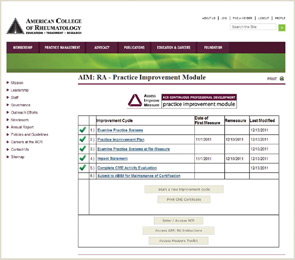The ACR Rheumatology Clinical Registry (RCR) is an easy-to-use tool developed to assist members in practice improvement, local population management, and efficient, successful participation in national quality programs. RCR integrates evidence-based quality measures aimed at improving care and drug safety for patients with rheumatoid arthritis, osteoarthritis, osteoporosis, and gout.
You can earn Maintenance of Certification (MOC) points and continuing medical education (CME) credits by entering data into the RCR. The ACR has streamlined the process for completing the Assess Improve Measure (AIM) program for rheumatoid arthritis by integrating the program into the RCR. This program now allows you to build on data already entered for quality-improvement and/or reporting purposes for Centers for Medicare and Medicaid Services (CMS) programs and earn a maximum of 20 AMA PRA Category 1 credits and 20 Self-Evaluation of Practice Performance points in the American Board of Internal Medicine’s MOC program.
AIM:RA is a web-based self-evaluation of practice performance tool (see Fig. 1) designed to guide a physician or physician-designated abstractor (e.g., office staff) through medical-chart data abstraction using a series of questions related directly to evidence-based quality indicators. AIM is designed for physicians engaged in the ABIM MOC program, or physicians seeking a quality-improvement or practice-audit tool.
The data will culminate in automated reports enabling physicians to:
- Reflect on practice performance data;
- Identify practice strengths and areas for improvement;
- Develop and implement an improvement plan;
- Assess impact of changes through chart remeasurement; and
- Report changes.
To get started using AIM:RA, first register for the RCR, then go through the data-entry process, answering all required questions for AIM in the RA form within RCR. AIM is equipped with comprehensive data reports and templates for the development of the physician-improvement plan and impact statement. The improvement plan allows the physician to create a detailed course of action for practice improvement during the improvement phase. The impact statement, which signifies the completion of the module, allows the physician to reflect on his or her experience and practice performance.
As the RCR expands, rheumatology-related benchmarks will become evident, allowing each physician to evaluate his or her practice against the aggregated performance statistics of other practices.
Review the instructions at www.rheumatology.org/education to learn more about the AIM:RA program.
ACR members and their practice teams can use the RCR for quality improvement and population management for free. Be sure to review the specifics of each program in order to start earning your incentive payments and avoid harsh penalties.
